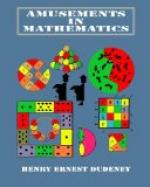The editor of the Times newspaper was invited by a high Russian official to inspect the gold stored in reserve at St. Petersburg, in order that he might satisfy himself that it was not another “Humbert safe.” He replied that it would be of no use whatever, for although the gold might appear to be there, he would be quite unable from a mere inspection to declare that what he saw was really gold. A correspondent of the Daily Mail thereupon took up the challenge, but, although he was greatly impressed by what he saw, he was compelled to confess his incompetence (without emptying and counting the contents of every box and sack, and assaying every piece of gold) to give any assurance on the subject. In presenting the following little puzzle, I wish it to be also understood that I do not guarantee the real existence of the gold, and the point is not at all material to our purpose. Moreover, if the reader says that gold is not usually “put up” in slabs of the dimensions that I give, I can only claim problematic licence.
Russian officials were engaged in packing 800 gold slabs, each measuring 121/2 inches long, 11 inches wide, and 1 inch deep. What are the interior dimensions of a box of equal length and width, and necessary depth, that will exactly contain them without any space being left over? Not more than twelve slabs may be laid on edge, according to the rules of the government. It is an interesting little problem in packing, and not at all difficult.
372.—THE BARRELS OF HONEY.
[Illustration]
Once upon a time there was an aged merchant of Bagdad who was much respected by all who knew him. He had three sons, and it was a rule of his life to treat them all exactly alike. Whenever one received a present, the other two were each given one of equal value. One day this worthy man fell sick and died, bequeathing all his possessions to his three sons in equal shares.
The only difficulty that arose was over the stock of honey. There were exactly twenty-one barrels. The old man had left instructions that not only should every son receive an equal quantity of honey, but should receive exactly the same number of barrels, and that no honey should be transferred from barrel to barrel on account of the waste involved. Now, as seven of these barrels were full of honey, seven were half-full, and seven were empty, this was found to be quite a puzzle, especially as each brother objected to taking more than four barrels of, the same description—full, half-full, or empty. Can you show how they succeeded in making a correct division of the property?
CROSSING RIVER PROBLEMS
“My boat is on the shore.”
BYRON.




